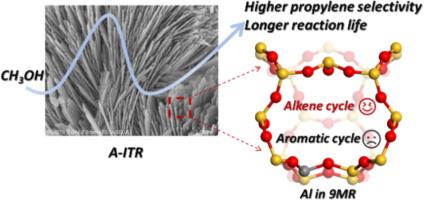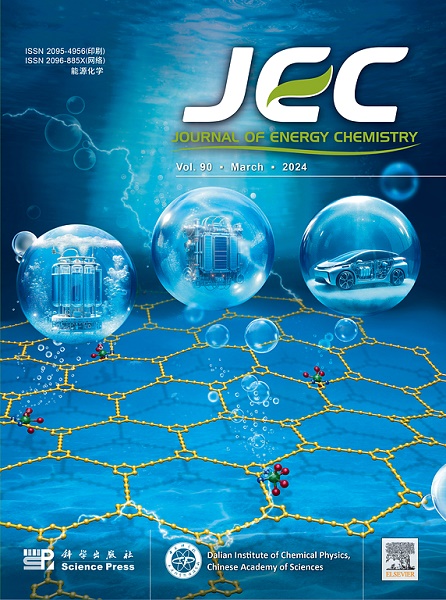Regulation of Al distribution in ITR zeolite for methanol to propylene
IF 13.1
1区 化学
Q1 Energy
引用次数: 0
Abstract
ITR zeolite could be potentially used as catalysts in methanol to propylene (MTP), where their performance is strongly related to its Al distribution. However, the control of Al distribution in ITR zeolite poses a significant synthetic challenge. Herein, we demonstrate the possibility to control the Al distribution in ITR zeolites using zeolite A as an aluminum source (A-ITR). The A-ITR exhibited similar crystallinity, nanosheet morphology, textual parameters, and acidic concentration with those of conventional ITR made zeolites using aluminum isopropoxide as an aluminum source (C-ITR). Characterizations of the zeolite product with 27Al MQ MAS NMR spectra, 27Al MAS NMR spectra, and 1-hexene cracking reveal that the A-ITR zeolites have more Al species distributed in T6 and T8 sites located in relatively smaller micropores of the framework than C-ITR. As a result, the A-ITR gave enhanced catalyst lifetime and propylene selectivity due to the suppression of the aromatic cycle in the MTP reaction, compared with the C-ITR. This work provides an alternative approach to prepare efficient ITR zeolites for MTP reaction.

调节甲醇制丙烯过程中 ITR 沸石中的铝分布
ITR 沸石可用作甲醇制丙烯 (MTP) 的催化剂,其性能与铝的分布密切相关。然而,控制 ITR 沸石中的铝分布是一项重大的合成挑战。在此,我们展示了使用沸石 A 作为铝源(A-ITR)控制 ITR 沸石中铝分布的可能性。A-ITR 的结晶度、纳米片形态、纹理参数和酸性浓度与使用异丙醇铝作为铝源制造的传统 ITR 沸石(C-ITR)相似。利用 27Al MQ MAS NMR 光谱、27Al MAS NMR 光谱和 1-hexene 裂解对沸石产品进行表征后发现,与 C-ITR 相比,A-ITR 沸石有更多的铝物种分布在位于框架相对较小的微孔中的 T6 和 T8 位点。因此,与 C-ITR 相比,由于抑制了 MTP 反应中的芳烃循环,A-ITR 的催化剂寿命和丙烯选择性都得到了提高。这项研究为制备用于 MTP 反应的高效 ITR 沸石提供了另一种方法。
本文章由计算机程序翻译,如有差异,请以英文原文为准。
求助全文
约1分钟内获得全文
求助全文
来源期刊

Journal of Energy Chemistry
CHEMISTRY, APPLIED-CHEMISTRY, PHYSICAL
CiteScore
19.10
自引率
8.40%
发文量
3631
审稿时长
15 days
期刊介绍:
The Journal of Energy Chemistry, the official publication of Science Press and the Dalian Institute of Chemical Physics, Chinese Academy of Sciences, serves as a platform for reporting creative research and innovative applications in energy chemistry. It mainly reports on creative researches and innovative applications of chemical conversions of fossil energy, carbon dioxide, electrochemical energy and hydrogen energy, as well as the conversions of biomass and solar energy related with chemical issues to promote academic exchanges in the field of energy chemistry and to accelerate the exploration, research and development of energy science and technologies.
This journal focuses on original research papers covering various topics within energy chemistry worldwide, including:
Optimized utilization of fossil energy
Hydrogen energy
Conversion and storage of electrochemical energy
Capture, storage, and chemical conversion of carbon dioxide
Materials and nanotechnologies for energy conversion and storage
Chemistry in biomass conversion
Chemistry in the utilization of solar energy
 求助内容:
求助内容: 应助结果提醒方式:
应助结果提醒方式:


